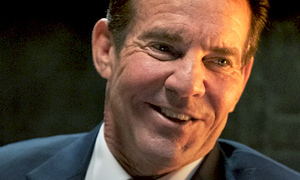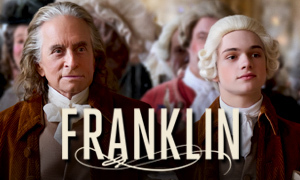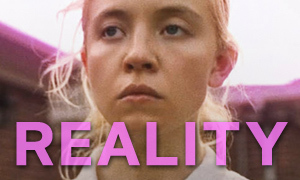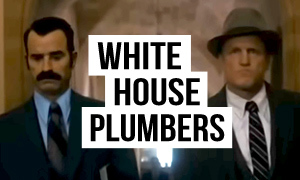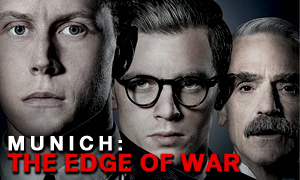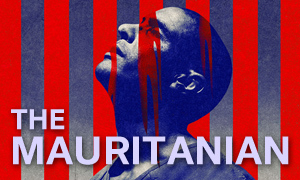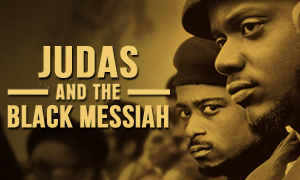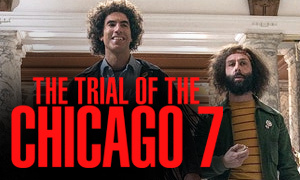Lee Daniels' The Butler: History vs. Hollywood
based on Will Haygood's 2008 Washington Post article "A Butler Well Served by This Election"
| REEL FACE: | REAL FACE: |
Forest Whitaker
Born: July 15, 1961 Birthplace: Longview, Texas, USA | Eugene Allen
Born: July 14, 1919 Birthplace: Scottsville, Virginia, USA Death: March 31, 2010, Takoma Park, Maryland, USA (renal failure) |
Oprah Winfrey
Born: January 29, 1954 Birthplace: Kosciusko, Mississippi, USA | Helene Allen
Born: June 17, 1922 Birthplace: Conway, North Carolina, USA Death: November 3, 2008, Washington D.C., USA |
Elijah Kelley
Born: August 1, 1986 Birthplace: LaGrange, Georgia, USA | Charles Allen
Born: 1946 |
Was the real Cecil Gaines born on a plantation like in The Butler movie?
Yes. The true story behind Eugene Allen verifies that he was born on a plantation in Virginia (not Georgia). He worked for the family as a house boy doing chores such as washing dishes. The skills he gained on the plantation prepared him to work as a waiter at the Homestead Resort in Hot Springs, Virginia and then at a Washington, D.C. country club, followed by his position as butler in the White House.
Was the real Cecil Gaines' mother raped and father shot on the plantation?
There is no evidence that Eugene Allen's mother was raped or that his father was shot and killed by the plantation owner like in the movie. The Butler director Lee Daniels and screenwriter Danny Strong injected these events into the movie in order to create the fear that builds subservience into Cecil's DNA.
How did Eugene Allen and his wife Helene meet?
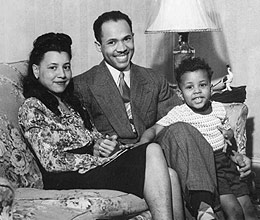
Eugene Allen with his wife Helene and their only son Charles in 1948.
How did Eugene Allen land his job at the White House?
In 1952, the real Cecil Gaines, Eugene Allen, was working as a waiter at a Washington D.C. country club. After being informed by a co-worker of job openings at the White House, he applied. Allen met with Alonzo Fields, a maitre d', who instantly liked him. "I wasn't even looking for a job," Allen admits (The Washington Post). This differs from the movie, which finds Eugene Allen's onscreen counterpart, Cecil Gaines (Forest Whitaker), being contacted by the White House and offered the job after a senior White House staffer witnesses Cecil in action at a D.C. hotel. The invented scene is what then prompts his wife Gloria Gaines (Oprah Winfrey) to emphatically state, "The White House call him, he didn't call the White House," in a moment of fiction.
How long did the real Cecil Gaines, Eugene Allen, work as a White House butler?
Mr. Allen worked for 34 years in the White House under eight presidents. He was hired in 1952 as a pantry worker and worked his way up to butler after several years. This contrasts the movie, which has Cecil starting to work as a butler immediately. In 1980, during the Reagan administration, Mr. Allen was promoted to maitre d', the position he held when he retired in 1986.
Why was Eugene Allen's name changed to Cecil Gaines for the movie?
"While the movie The Butler is set against historical events, the title character and his family are fictionalized," states director Lee Daniels. "We were able to borrow some extraordinary moments from Eugene's real life to weave into the movie." -The Butler: A Witness to History
"It's important to understand," says Danny Strong, who penned The Butler script, "there's a reason why the character's name is Cecil Gaines. Because this is not the Eugene Allen story. It's not just about him. We were hoping to capture the essence of Eugene Allen, and I think we did. But it's not just about him. It's about several other people I spoke to that worked at the White House as well so that the film would create this universal truth for many people of what that experience was like." -WorldandFilm.com
Did Jackie Kennedy really insist on leaving on her blood-stained pink Chanel suit?
Yes. In the The Butler movie, we see Cecil Gaines (Forest Whitaker) standing before Jackie Kennedy (Minka Kelly), who is still wearing the blood-stained pink Chanel suit that she was wearing when her husband was shot. In real life, Jackie insisted on wearing the suit for the swearing in of Lyndon B. Johnson that took place aboard Air Force One, the same flight that transported her husband John F. Kennedy's body back to Washington, D.C. When Lady Bird Johnson asked her if she wished to have someone help her change out of her blood-soaked clothes, Jackie replied, "Oh, no ... I want them to see what they have done to Jack." -Coco Chanel: The Legend and the Life
Did Eugene get a personal invitation to attend JFK's funeral?
Yes. The Butler true story reveals that Eugene Allen was working in the White House kitchen on the day that President Kennedy was assassinated. He turned down a personal invitation to President John F. Kennedy's funeral, instead devoting himself in another way, "Somebody had to be at the White House to serve everyone after they came from the funeral," says Eugene. -The Washington Post
Did Jackie Kennedy really give one of her late husband's ties to the butler Eugene Allen?
Yes. Like in the movie, Jacqueline Kennedy did give one of JFK's ties to Eugene. "Jack Kennedy was very nice," says Eugene. "And so was Mrs. Kennedy." -The Washington Post
Did the Allens' son die in the Vietnam War?
No. In the movie, the Gaines' youngest son Charlie (Elijah Kelley) dies in Vietnam, requiring Cecil to maintain his composure and poise while confronting Nixon. When comparing The Butler movie fiction vs. fact, we discovered that in real life, Eugene and Helene Allen's only son, Charles, did in fact serve in Vietnam, but he did not die there. He returned home and became an investigator with the State Department (The Washington Post).
Is the eldest son in the movie, Louis Gaines, based on a real person?
No. During our research into The Butler true story, we quickly learned that the Louis Gaines character, portrayed by actor David Oyelowo, is entirely fictional, as is the subplot involving the character. This includes Louis joining the Freedom Riders and the Black Panthers, and the rift that develops between Cecil and his son as a result. In real life, Eugene and Helene Allen only had one son, not two.
Was the real Gloria Gaines an alcoholic?
No. Although this aspect of the character may have provided fodder for Oprah Winfrey to sink her acting chops into, the real Gloria Gains, Helene Allen, was not an alcoholic, nor did she contemplate an extra-marital affair. -DailyBulletin.com
Is the movie accurate in depicting President Ronald Reagan as being racist?
No. The Butler movie depicts President Ronald Reagan (Alan Rickman) stating that he will refuse to impose sanctions against South Africa for its racist policies. The true story behind The Butler movie reveals that the situation was much more complex than Lee Daniel's film makes it appear. At the time, America was entangled in the Cold War with the Soviet Union and their communist allies. South Africa was the only country on the African continent that held a strong anti-communist position. Reagan's hesitation to issue sanctions arose in part because he did not want to disrupt America's anti-communist alliance with the country, not because he thought apartheid in South Africa was okay. The sanctions would have also impacted the least affluent in the country first, who were mainly the blacks there.
Did First Lady Nancy Reagan really invite Eugene and his wife to a state dinner?

Eugene with President Reagan and Nancy Reagan. In their living room, the Allens displayed several pictures of such moments with the Reagans.
Did Eugene really decide to retire after realizing at the state dinner that he had all along been a subservient performer for whites?
No. In The Butler movie, Cecil (Forest Whitaker) watches his fellow butlers serve him at the state dinner and realizes he has in fact been wearing a mask over the years to cover up the subservient nature of his job. It is implied that this realization is what causes him to make the decision to retire. In real life, Eugene Allen always expressed pride with regard to his job and his time at the White House.
When Wil Haygood interviewed Eugene and his wife Helene for The Washington Post article, Helene admitted she was nervous about trying to make small talk with world leaders at the state dinner, adding, "Had champagne that night," which caused her husband to grin. He was, after all, the man who stacked the White House champagne. There was no indication in Haygood's article or book that Eugene had any sort of realization during the state dinner. Eugene spoke of the dinner with excitement, "I'm telling you!" he said. "I believe I'm the only butler to get invited to a state dinner." He was correct.
When he retired after 34 years, President Reagan wrote him a tender note and Nancy Reagan tightly hugged him. In his scrapbook, Eugene referred to the White House by writing, "The White House is different because it is the White House. It's considered the number one house in the world. And just to be around the president and the first lady, every day, it's different from other people. Even though they are people just like we are."
How does Eugene Allen's son Charles feel about the movie?
"I feel great about Forest portraying my father," says Charles Allen. "I think it's gonna have to be somebody who is capable of delivering a nuanced performance, and Forest is more than capable." -The Butler Featurette
What prompted Wil Haygood to write the 2008 Washington Post article on which The Butler was based?
Writer Wil Haygood had a hunch that Barack Obama would win the 2008 U.S. presidential election. To highlight the history making moment, Wil wanted to tell the story of someone who had come of age when the country was still segregated and lived to see a black man become president. When Wil came across former White House butler Eugene Allen, he knew that he had found the perfect story to tell. -The Butler: A Witness to History
Is it true that U.S. President Barack Obama was asked to be in The Butler?
There has been a lot of debate as to whether or not President Obama was asked to be in the film, as well as what his response was if asked. During an interview with Gayle King for the Oprah Winfrey Network, director Lee Daniels said, "It was more powerful to not have Obama in it but we did go back and forth." He went on to admit that they didn't include him because, "We couldn't get him!" In an interview a few days later, Daniels said, "No, I was too afraid to ask him. We wanted him to do it but he was running for office so I think he had better things—more important things [to do]." (Yahoo! Movies) Daniels then did an interview with Entertainment Tonight where the interviewer said, "I understand you tried to get Obama to be in the movie," to which Daniels replied, "Yes, we did." The only thing that can be said with certainty is that the President is not in the film aside from historic footage. Instead, actor Orlando Eric Street portrays President Barack Obama.
Did Eugene's wife Helene really die just prior to Obama's election?
Yes. Sadly, Helene did not witness the election. She passed away on November 3, 2008, the day before Barack Obama won the election.
How did Eugene Allen feel about the election of the first black President?

Eugene Allen at President Obama's inauguration on January 20, 2009 as a VIP guest.
The Butler Movie Trailer and Related Videos
Watch The Butler movie trailer below and view a featurette that includes interviews with the director, Oprah Winfrey and the son of the real butler.
WATCH The Butler FeaturetteDirector Lee Daniels, Oprah Winfrey and
Charles Allen, the son of Forest
Whitaker's real-life counterpart, reflect
on Forest's performance in the movie and
the man that inspired the part. Despite
portraying a fictionalized character based
on a real person, Forest emphasizes that
when it came to portraying the White House
butler, it was important that he did it
"appropriately and accurately." |
WATCH Lee Daniels' The Butler TrailerLee Daniels directs Forest Whitaker and
Oprah Winfrey who portray husband and wife
Cecil and Gloria Gaines. The movie is
based on real-life White House butler
Eugene Allen, who worked in the White
House under eight presidents, coming of
age during segregation and living to see a
black man be elected to the White House. |
Link-to-Learn More:
- "A Butler Well Served by This Election" Washington Post Article by Wil Haygood
- The Butler Official Movie Site
